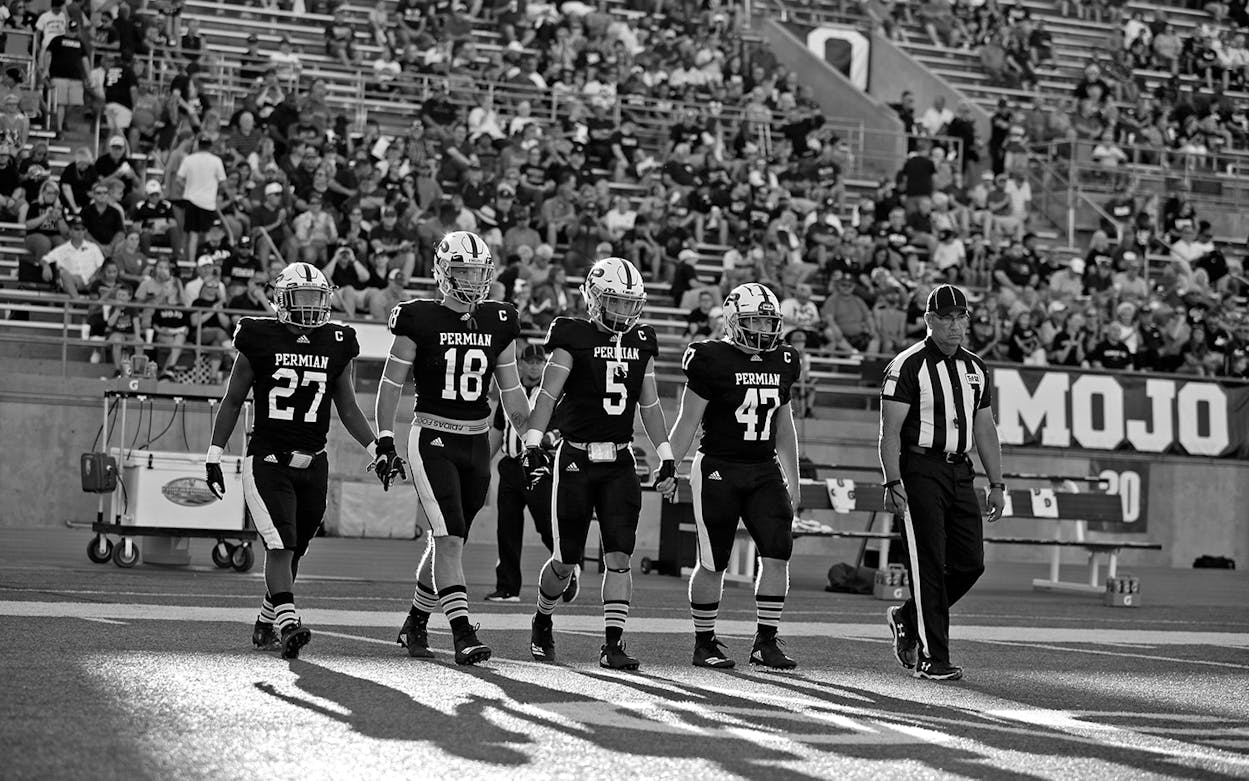Ask any West Texan and they’ll tell you that the Permian Basin is best known for two things: oil and football. No high school football team in the country is more famous than Odessa’s Permian Panthers. Their 1988 season was chronicled in one of the best-selling sports books of all time, Friday Night Lights, which inspired a Hollywood film and a critically acclaimed TV series. To this day, a Permian game at Ratliff Stadium remains a major event. Coveted season tickets are passed down from one generation to the next like sacred family heirlooms. The stands are filled to capacity with more than 19,000 fans. The home side is a sea of black and white and silver. There’s electricity in the air.
That was the scene one Friday night this fall when we went to watch the Permian Panthers take on the Southlake Carroll Dragons. On the sidelines standing alongside the cheerleaders and players was Elizabeth Faught, affectionately known as the Mojo Queen. At 84 years old, Mrs. Faught has been a diehard Permian fan for seven decades. She travels with the team as a sponsor, often offering moral support to the players from the cover of a helmet-shaped umbrella. When the Panthers reach the playoffs, it’s Mrs. Faught who sews the players’ last names onto their jerseys. We sat down to talk about the historic football program with her and with Allen Jones, a longtime teacher at Permian High and a living encyclopedia of all things Mojo.
When Buzz Bissinger moved to Odessa to begin reporting Friday Night Lights, the city was going through hard times. It was 1988, and the bust was in full swing. Mojo football was Odessa’s one bright spot—a rallying point for the community. And while there was little to rejoice economically, the Panthers gave Odessa plenty to celebrate. Permian dominated Texas football in the eighties—they won three of their six state championships and were mainstays at the top of the national rankings. But the Permian players who suited up this season have had a far different experience than those that Bissinger followed in 1988. While the ’88 team weathered the region’s worst bust, the kids that played ball this season did so amid the biggest boom Odessa has ever seen.
The oil boom has brought in thousands of new students, and they’re crammed into schools that were built for far fewer kids. Last school year, a photo spread across social media of Permian High students sitting on Home Depot buckets because there weren’t enough desks and chairs. One teacher at Permian wound up teaching pre-calculus to 63 students in a single classroom. For a number of reasons, it’s tough to find and keep enough teachers to meet the surging number of students across the Permian.
To learn more about how the boom has affected schools, we visited the campus of Permian High School. We sat down with Dawnna Talley, the English department chair, and Karen Hart, who chairs the science department. When we asked how the boom is affecting the schools, they didn’t mince words. “It kills us,” Dawnna said. “I mean, it’s hard. It truly is hard.”
Odessa recently managed to raise the pay for their teachers, but the district continues to bleed staff. Permian’s athletic director and head football coach both left over the past year. In 2018, the school district was short some 240 teachers. They started this school year more than 300 teachers short. Recruiting new teachers has meant casting a much wider recruitment net than just West Texas. Dawnna and Karen have recently brought in teachers from as far away as Spain and India.
From Odessa, we travel north to my hometown of Andrews. There I speak with my grandfather, Leland Hamilton. My granddad is kind of the equivalent of Permian’s Mojo Queen in Andrews. He’s 95 years old, born and raised in West Texas, and a diehard Mustangs fan. For most of the last three decades, every day during football season, Granddad walked the half mile from his old house up to the high school to watch the team practice. He’s become a fixture on the sidelines—known by every coach and player simply as “Pop.” We talked about the role high school football plays in communities across West Texas. “It’s just in the blood, I think,” he said, “and that’s more so out here than it is in some other places. It’s a tough sport,” he said. “It’s a tough sport.”
Editor’s note: One of our astute listeners has caught a mistake in this episode: the “mojo” idea came from a song by Moe Bandy and Joe Stampley, not Moe Band and Joe Diffee.








